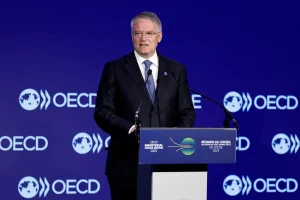Oil Prices Plummet Amid Tariff Turmoil and OPEC+ Production Shifts

Oil markets are experiencing significant volatility due to recent geopolitical developments. The introduction of new tariffs by U.S. President Donald Trump has intensified fears of a global trade war, potentially dampening oil demand. Concurrently, the Organization of the Petroleum Exporting Countries and its allies (OPEC+) have accelerated plans to increase oil production, further influencing market dynamics.
Tariffs Trigger Market Uncertainty
On April 3, 2025, President Trump announced sweeping tariffs, including a baseline 10% duty on all imports and higher targeted tariffs on numerous countries. Major economies such as Japan, China, and EU nations have condemned these measures, with some pledging retaliatory actions. This escalation has led to global financial market turmoil, with investors seeking refuge in safer assets like bonds, the Japanese yen, and gold. The dollar index fell to 102.98, its lowest since mid-October. Analysts are concerned that these tariffs could stoke inflation, slow economic growth, and intensify trade disputes, all of which may weigh heavily on oil prices.
OPEC+ Accelerates Production Increases
In a surprising move, OPEC+ has decided to expedite the phase-out of oil output cuts. Eight member nations, including Saudi Arabia and Russia, agreed to increase crude production by 411,000 barrels per day (bpd) in May, surpassing the initially planned 135,000 bpd increment. This decision is based on perceived healthy market fundamentals and a positive outlook. However, the accelerated production has contributed to a sharp decline in oil prices, with Brent crude falling over 6% to below $70 a barrel.
Market Reactions and Investor Sentiment
The combination of new tariffs and increased oil production has led to significant market reactions.
Oil prices fell over 1% on April 4, marking their worst week in months. Brent crude dropped to $69.38 per barrel, while U.S. West Texas Intermediate declined to $66.13. Investors are increasingly concerned that the escalating trade tensions and potential oversupply could reduce oil demand, further impacting financial markets worldwide.
Implications for the Global Economy
The recent developments have raised fears of a global recession. The tariffs have sparked concerns about rising inflation and slowed economic growth. Major economies are bracing for potential retaliatory measures, which could exacerbate the situation. The energy sector is particularly vulnerable, as decreased demand and increased supply may lead to prolonged price instability.
Looking Ahead
As the situation unfolds, stakeholders in the oil market must closely monitor policy changes and market responses. The interplay between geopolitical decisions and market fundamentals will be crucial in determining the future trajectory of oil prices. Companies and investors should remain vigilant and adaptable to navigate this period of heightened uncertainty.
In conclusion, the convergence of aggressive trade policies and shifts in oil production strategies has created a complex and volatile environment for the global oil market. Understanding these dynamics is essential for anticipating future trends and making informed decisions in the energy sector.
















Comments are closed.